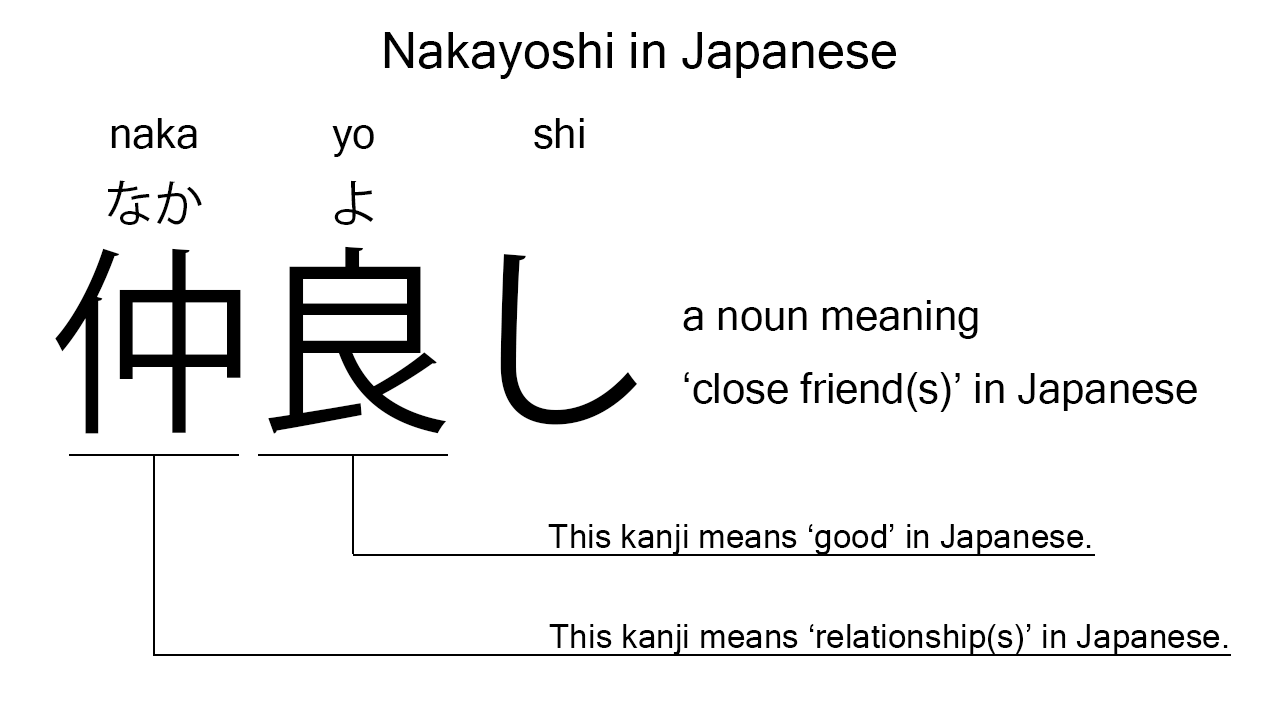What does “nakayoshi” mean in Japanese?
Native speakers say “nakayoshi” to mean ‘close friend’ in Japanese. Perhaps, some Japanese learners know this word as it is sometimes used in Japanese movies, songs, novels, manga, anime, and the like. In this blog post, however, I will explain this word in detail based on its kanji expression. And also, I will explain how to use it through example sentences. My explanations would help Japanese learners understand “nakayoshi” more clearly. Then, let’s get started!
Contents
Definition and meanings of “nakayoshi”
Let me start with the definition and meanings of “nakayoshi”.
- nakayoshi – 仲良し (なかよし) : a noun meaning ‘close friend’ in Japanese. This can also refer to a relationship between close friends. This can also work as plural. Learn more about Japanese plural.
The definition and meanings are not that difficult, I think. To understand this noun more clearly, however, let me explain its kanji expression in detail.
What does “nakayoshi” literally mean in Japanese?
The kanji expression of “nakayoshi” contains the following two kanji characters:
- 仲 : a kanji character used to mean ‘relationship’ in Japanese. This can also be found in other words like “nakama“.
- 良 : a kanji character used to mean ‘good’ in Japanese.
These two kanji characters tell us that the formed noun literally means a ‘good relationship’ in Japanese. This literal interpretation is very close to the actual meanings, I think. Close friends often have good relationships.

When we meet new kanji expressions, we should check their kanji characters in detail to understand their meanings clearly and deeply. In many cases, kanji characters tell us a lot about the meanings of the expressions they form. Actually, here, we could get the better understanding of “nakayoshi” through the detailed check above.
So far, I’ve explained the definition and meanings of “nakayoshi” together with its kanji characters. Then, let me explain how to use it through the example sentences below.
Example #1: how to say “close friends” in Japanese
kanojo tachi wa nakayoshi desu – 彼女達は仲良しです (かのじょたちはなかよしです)
They are close friends.
Below are the new words used in the example sentence.
- kanojo – 彼女 (かのじょ) : a pronoun meaning ‘she’ in Japanese.
- tachi – 達 (たち) : a suffix used after a noun or pronoun to make its plural form. In the example, this is used after “kanojo” to make its plural form, “kanojo tachi”, which means ‘they’ in Japanese.
- wa – は : a binding particle working as a case marker or topic marker. In the example, this works after “kanojo tachi” to make the subject in the sentence.
- desu – です : an auxiliary verb used after a noun or adjective to make it polite. Probably, this is well known as a part of Japanese desu form. In the example, this is used after “nakayoshi” to make it sound polite.
This is a typical usage of “nakayoshi”. When we want to say “close friends” in Japanese, this noun is always a very good option.
Example #2: another usage of “nakayoshi”
watashi wa imouto to nakayoshi desu – 私は妹と仲良しです (わたしはいもうととなかよしです)
I’m very close to my little sister.
Below are the new words used in the example sentence.
- watashi – 私 (わたし) : a pronoun meaning ‘I’ in Japanese. In the example, this works together with “wa” to become the subject in the sentence.
- imouto – 妹 (いもうと) : a noun meaning ‘little sister’ in Japanese. This can also work as plural.
- to – と : a case particle used to say with whom someone does something. In the example, this is used after “imouto” to say to whom the speaker is close.
This is another typical usage of “nakayoshi”. In this example, it works to describe the close relationship between the speaker and the speaker’s little sister. When we want to mean a ‘close relationship’ in Japanese, this noun can be a good option.
Summary
In this blog post, I’ve explained the definition and meanings of “nakayoshi” in detail based on its kanji expression. And also, I’ve explained how to use it through the example sentences. Let me summarize them as follows.
- nakayoshi – 仲良し (なかよし) : a noun meaning ‘close friend’ in Japanese. This can also refer to a relationship between close friends. This can also work as plural. These two kanji characters literally mean a ‘good relationship’ in Japanese. This literal interpretation is very close to the actual meanings. Close friends often have good relationships.
Hope my explanations are understandable and helpful for Japanese learners.